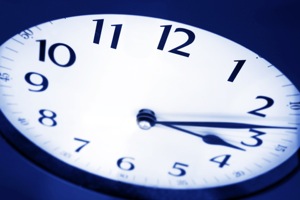
Do you have Hashimoto’s hypothyroidism and consistently wake up around 3 a.m. and can't fall back asleep? Although the reasons for sleep problems can be complex, waking up too early is often a symptom of hypoglycemia, or low blood sugar, and can be remedied through dietary changes and nutritional therapy.
Balancing blood sugar is vital not only to a good night’s sleep, but also to managing your autoimmune Hashimoto’s hypothyroidism.
Why you wake up at 3 a.m.
The brain is highly active at night, transforming short-term memory into long-term memory and carrying out repair and regeneration, and it depends on a steady supply of energy to do these tasks. When you sleep at night your body goes into a fasting state. In order not to deprive the brain of the food it needs for energy, the body compensates by gradually raising cortisol, an adrenal hormone. Cortisol stimulates the body to release or create glucose to supply the brain with energy during the night-long fast.
Chronic low blood sugar, however, throws a kink in this process. People with hypoglycemia tend to have difficulty making the right amount of cortisol at the right times of the day or night. They also have blood sugar levels that spike and then crash throughout the day. If they go too long without eating they experience lightheadedness, irritability, shakiness, a spacey feeling, and other symptoms that signify the brain is not getting enough glucose.
In these cases, not only does blood sugar drop too low during the night, but the adrenal glands don’t produce enough cortisol to keep the brain fueled. In response, the body sounds the emergency alarm by releasing "fight-or-flight" hormones. These stress hormones raise blood sugar back to a safer level. Unfortunately, they also raise stress, which can cause anxiety or panic in the middle of the night. Hence the waking up at 3 a.m. and not being able to fall back asleep.
For the person with Hashimoto’s hypothyroidism, this situation can also further imbalance an autoimmune condition and aggravate your thyroid condition.
How to fall asleep if you wake up at 3 a.m.
A quick fix for waking up at 3 a.m. can be as simple as eating a small amount of protein, with perhaps some fat thrown in—a spoonful of nut butter, a little bit of meat, or a hard-boiled egg. For some people this raises blood sugar to a healthier level and sustains it so they can fall back asleep. It's best not to eat something sweet or starchy (however tempting to your hungry brain) because this will just cause blood sugar to spike and crash again.
Daytime tips to avoid waking up at 3 a.m. and manage your Hashimoto’s hypothyroidism
Although a 3 a.m. snack may help you fall back asleep, it's better to prevent that anxious awakening in the first place. If you wake up regularly at 3 a.m. you may suffer from chronic low blood sugar and need dietary therapy. Symptoms include:
- Sugar cravings
- Irritability, light-headedness, dizziness, or brain fog if meals are missed
- Lack of appetite or nausea in the morning
- The need for caffeine for energy
- Eating to relieve fatigue
- Energy crashes in the afternoon
A diet that stabilizes daytime blood sugar levels will have you sleeping better and will help better manage your Hashimoto’s hypothyroidism. This requires that you:
- Never skip breakfast and eat a breakfast lower in carbohydrates. If you have chronic low blood sugar you may have lost the ability to feel hunger and you need to eat in the morning and throughout the day (even if you don’t feel like it).
- Eat frequently enough so blood sugar does not crash.
- Ditch the sweets and starchy foods and adopt a lower-carbohydrate diet. People with low blood sugar symptoms typically eat too many sweets and starchy foods (breads, pasta, rice, potatoes, etc.) and also frequently skip meals. Go for foods lower on the glycemic index and eat enough protein and healthy fats to sustain your energy.
A variety of nutritional compounds can further support your blood sugar handling and stress hormone functions so you sleep better and can better manage your Hashimoto’s hypothyroidism. Ask my office how we can help.





Latest from the Blog
Do You Know What Is In Your Protein Powder?
January 14, 2025What’s Really in Your Protein Powder? Understanding the Risks Protein powders are a staple in many health-conscious diets, from athletes seeking muscle recovery to those simply aiming to boost their daily protein intake. With a wide variety of options available, choosing the right one can feel overwhelming. However, recent findings have raised concerns about what’s […] Read more
Latest from the Blog
Breaking Through Cancer Barriers: News Outlets Spotlight High-Dose Vitamin C Therapy
https://www.yahoo.com/news/pancreatic-cancer-patient-survival-doubled-152722177.html Harnessing the Power of High-Dose Vitamin C in Cancer Treatment Recent advances in cancer treatment research have brought renewed attention to high-dose intravenous (IV) vitamin C, particularly in extending survival rates for patients with advanced different forms of cancer. A groundbreaking phase 2 clinical trial Study Finds demonstrated that combining high-dose IV vitamin C […] Read more